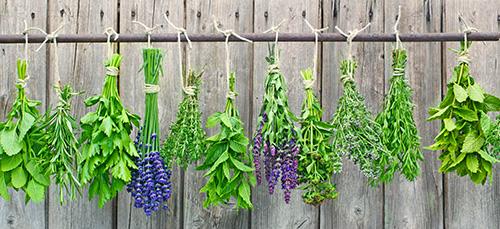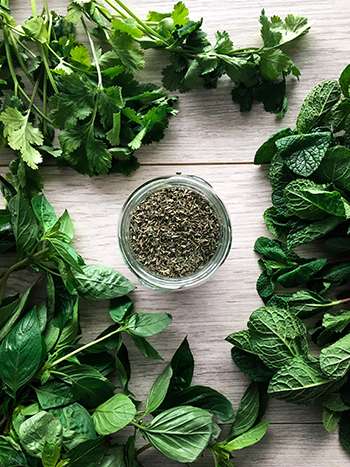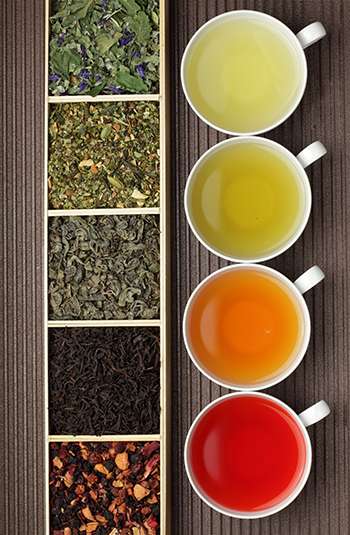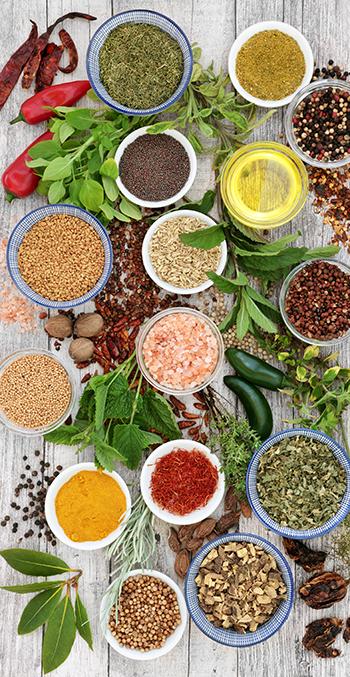
Fresh or Dried Herbs?
With such an abundance of herbs in all different formats, are fresh or dried herbs better for you?
The world is becoming incredibly in tune with the medicinal benefits of herbs and everything to do with natural remedies. Herbs have come under the spotlight over the last 10 years. Both laypeople and experts have become awakened to their possible relieving qualities that could mean less reliance on pharmaceutical intervention. Of course, historically, our knowledgeable ancestors have known about their healing qualities for many thousands of years before us.
Herbs are abundant all over North America and the world. They can be foraged and picked fresh for domestic consumption at home or made into tinctures and nutraceutical products that can be kept longer and used for ailment relief.
The biggest question is, are fresh herbs better than dried herbs, and what are the advantages of both?
What are the main differences between fresh and dried herbs?
The vital thing to know here is that all herbs start out as fresh herbs that can be found growing around the world, and there are some differences between the two versions of herbs that are important to know.
Moisture
As the name may suggest, the primary difference is that dried herbs are usually a dehydrated version of the fresh variety of herbs.
This basically means that the fresh variety of the herb has had much of the natural moisture and oil removed from the fresh herb, making the dried herb taste more intense with a more concentrated flavor profile.
Potency
The potency of the two variations of herbs is one of the most significant differences between fresh herbs and their dried counterparts.
Much of the herbs’ medicinal qualities lie in the natural oils they produce during their growth. These are the oils that hold most of the herb’s potency when we are talking about using them for naturopathic remedies.
However, not all potency is lost during the drying process, so dried herbs can give some medicinal benefits but are not as strong as fresh herbs with all of their natural oils intact.
Taste
 The flavor of dried herbs is generally more pungent in taste than that of the same herb in a fresh variety. This is because the flavor compounds have been concentrated throughout the drying process, which amplifies the herb’s flavor.
The flavor of dried herbs is generally more pungent in taste than that of the same herb in a fresh variety. This is because the flavor compounds have been concentrated throughout the drying process, which amplifies the herb’s flavor.
As dried herbs are more potent in flavor, it means that you will need less of them to make a flavorful impact, which is especially handy to know if you are using them for cooking or in herbal tea, for example.
The overuse of dried herbs can create an overbearing and sometimes unpleasant taste sensation, so it always pays to be mindful of the quantities you are using when the recipe states either fresh or dried herbs and you are interchanging them.
Texture
Fresh herbs generally have a texture full of moisture or oils when you touch them. For example, they can be anywhere from soft and velvety to woody when we are looking at thyme or rosemary.
When those same herbs have been dried, they can become brittle and dry and can even turn to dust when you touch them if they have been dried for a long time.
Dried herbs can benefit from being used in a suspension with plenty of moisture, such as a sauce, a tincture, or herbal tea, to rehydrate the dried herb you are using.
Shelf Life
It is a common misconception that dried herbs are going to last forever. However, dried herbs actually have no preservatives added to them to infinitely extend their shelf life. While their absence of moisture and natural oils will extend their shelf life to a certain extent, dried herbs do have the capacity to go bad. The best way to tell if your dried herbs have gone bad is to trust your nose; smelling them and detecting any aromas that are not supposed to be there will give you a great indication of the useability.
Fresh herbs, however, will have a much shorter shelf life. From the moment they are picked from their natural habitat, they will begin to degenerate, so it’s always best to only pick fresh herbs within a day or 2 of you needing to use them to save wastage.
Uses
Of course, both fresh and dried herbs can be used for similar things, but as you can imagine, there will be some better uses for one version of the herb over the other.
Dried herbs are suitable for:
- Any dish that requires the herb to be cooked out

- Tinctures
- Garnishes
- Teas
- Home Refreshing sprays
- Antibacterial suspensions
- Oil-based remedies
Fresh Herbs are suited to:
- Salads
- Garnishes
- Tinctures
- Teas
- Topical applications
- Raw consumption
- Light sauces
Overall, the uses of dried herbs versus fresh herbs are relatively similar.
However, you must remember that the quantities you are to use should be less when you are using dried herbs than if you were to use fresh herbs of the same variety.
Teas And Tinctures
We briefly mentioned that dried herbs benefit from being suspended in water or oil-based solution to rehydrate them and allow them to let out of their beneficial compounds.
benefit from being suspended in water or oil-based solution to rehydrate them and allow them to let out of their beneficial compounds.
This element of dried herbs makes them perfect for use in teas and tinctures. However, don’t be fooled into thinking that you require a higher quantity of them because of their reduced potency. If you use too much of a dried herb in a tea or tincture, you will find that it may develop a much much more robust flavor than if you had made the same solution with fresh herbs.
When we are looking at dried to fresh herb ratios, specifically for tinctures, we are looking at a mixture that is sufficient to support the uses it is intended for. For this, we look at the Herbal extract ratio.
A herbal extract, or tincture, is a liquid solution that comprises a mixture of herbs, alcohol, and water.
When dry herbs are used to create the herbal extract, the ratio of herbs to suspension liquid is commonly calculated as 1 part dried herbs to 4 parts suspension liquid in total.
When fresh herbs are used in a tincture suspension, the most common ratio to go by is 1 part herbs to 1 part fluid, so they become equal parts of the complete compound.
As you can see from the differences in ratios here, you need only a quarter of the number of dried herbs in a tincture versus one made with fresh herbs, which is astounding!
Take Away
Overall, there are a few significant differences between dried and fresh herbs. Of course, there may be requirements that call for one over the other.
Dried herbs are the dehydrated variation of a fresh herb, which, as we have seen, can increase their shelf life over fresh varieties of herbs. Still, they also lose some of their potency as their moisture and natural remedial oils are lost through the drying process.
Dried herbs are excellent when used in suspensions that are oil and water-based, as this allows them to become somewhat rehydrated. However, the quantities should be reduced for dried herb usage as the flavor becomes more concentrated during the drying process.
Fresh herbs are suited to most elements of herbal remedies, including tinctures, teas, and direct consumption. While they will be more potent in their remedial benefits, they have a much shorter shelf life than their dried counterparts. You may need more of them to increase the flavor of any dishes or teas.
You may also like:
How To Properly Dry Plants for Medicine
75+ Spring DIY Projects: No. 5 Will Take You by Surprise! (Video)
How To Make a Tincture Using Apple Cider Vinegar Instead of Alcohol
Fruit Juice vs. Whole Fruit. Which One is Better?
How Long Do Dried Herbs, Ointments, Syrups and Tinctures Last?


freezing has not been mentioned about keeping herbs
I freeze herbs. It’s great to not need to go to the store if you have a recipe you want to make. I don’t think believe there is much difference between fresh and frozen outside of the texture, especially with more leafy varieties.
I wondered about the efficacy of freezing them. I live alone so getting and keeping plant resources without wasting them is very important for me.
In my opinion what’s even more important than the dried vs. fresh herbs is the difference of wild grown and cultivated herbs.
Wild grown herbs have on average a moisture contents of roughly 85% whereas cultivated herbs have a moisture contents of nearly 92% per unit of weight.
Having that said wild herbs hold a lot more vitamins and nutrients per unit of weight.
I have still not received The Lost Book of Herbal Remedies!
I have still not received The Lost Book of Herbal Remedies!This is not a duplicate comment!!
Hi Bella,
Please check your personal email. I sent you an email regarding your order.
Many blessings and good health!